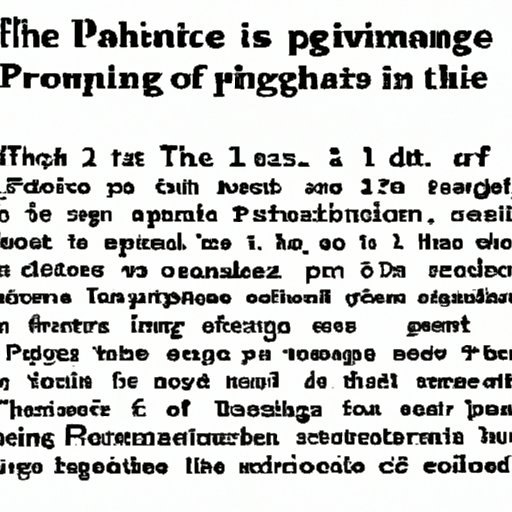Introduction
Computer programming is an important discipline in the field of technology. It involves writing instructions for a computer to execute, allowing it to complete tasks or solve problems. One of the most significant milestones in computer programming history is the development of the first computer program. This article will explore the person who wrote the first computer program and their impact on the industry.
A Historical Look at the Person Who Wrote the First Computer Program
The person responsible for writing the first computer program was Ada Lovelace. She was born Augusta Ada King, Countess of Lovelace, in London in 1815. Lovelace was a mathematician and writer, and her work was largely inspired by her friend Charles Babbage, who is known as the father of the modern computer.
Lovelace became interested in mathematics as a child, and she was tutored by Mary Somerville, a prominent scientist of the time. In 1833, Lovelace met Charles Babbage at a party and they quickly formed a close friendship. Babbage was developing a machine called the Analytical Engine that was designed to perform mathematical calculations and Lovelace was fascinated by his work.

How the First Computer Program Was Developed
In 1842, Lovelace was asked to translate an article written by Italian mathematician Luigi Menabrea about the Analytical Engine. While translating, Lovelace added her own notes and commentary, which included the first algorithm ever written specifically for a computer. This algorithm was designed to calculate Bernoulli numbers, which are a sequence of numbers used in mathematics.
Lovelace’s work was groundbreaking, as it demonstrated that computers could be used for more than just calculating. Her notes showed that computers could be used to solve complex problems and generate new insights. Despite this, Lovelace’s work was largely ignored until the 1950s when computer scientists began to recognize her contributions.
Creating the first computer program was a challenging task, as there were no existing examples to follow. Lovelace had to use her own knowledge of mathematics and computing to develop the algorithm. She also had to think outside the box to find creative solutions to the various challenges she faced.

An Analysis of the Impact of the First Computer Program
Ada Lovelace’s work laid the foundation for modern computer programming. Her algorithm was the first example of a computer program that could be used to solve complex problems and generate new insights. This paved the way for future innovators to build upon her work and create even more powerful computer programs.
Lovelace’s work has had a lasting impact on the field of computer science. Her pioneering efforts have inspired generations of computer scientists and her legacy continues to shape the way we think about computers and programming today. As Professor Ursula Martin from Oxford University said, “Ada Lovelace is a great example of someone who was ahead of her time and whose work still resonates today.”
Conclusion
Ada Lovelace was a pioneer in the field of computer programming. She wrote the first algorithm ever designed for a computer, paving the way for future innovators to build upon her work. Her legacy has had a lasting impact on the field of computer science and her pioneering efforts continue to inspire generations of computer scientists.
Through her creativity, determination, and hard work, Lovelace overcame the challenges of creating the first computer program and laid the groundwork for modern computer programming. Her work has shaped the way we think about computers and programming, and her legacy lives on today.
(Note: Is this article not meeting your expectations? Do you have knowledge or insights to share? Unlock new opportunities and expand your reach by joining our authors team. Click Registration to join us and share your expertise with our readers.)
